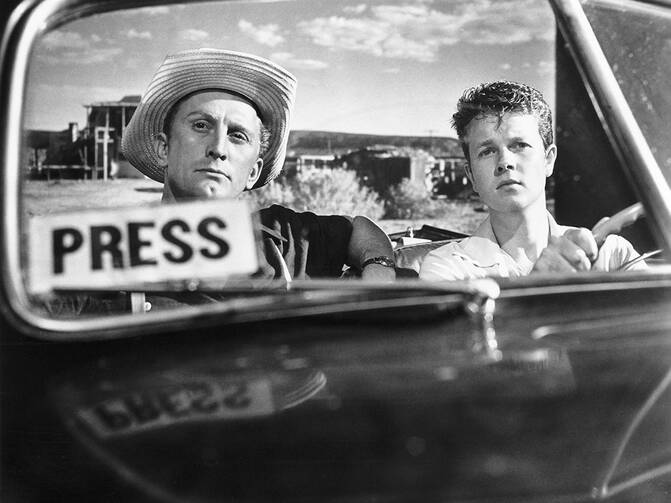The Donald Trump phenomenon was aptly described in a Washington Post story over the weekend. “It’s a big spectacle,” said Devin Wood, a supporter of Republican rival John Kasich, outside a Trump rally on Friday in Salt Lake City. “I think the showman in him thinks any type of news or any type of exposure is going to help. He relishes in seeing this because I think he’s a narcissist and he loves to see this whole hullabaloo just made up about him.”
“Big spectacle” made me think of “The Big Carnival,” the 1951 film by Billy Wilder about the media frenzy over a man trapped in a cave in a New Mexico desert. (Wilder’s title, since restored, was “Ace in the Hole,” but Paramount Pictures changed it something punchier. Mr. Trump might have suggested “The Huge Carnival.”) Like just about all Billy Wilder films, it’s unrelentingly cynical. Its protagonist, a reporter played by Kirk Douglas, colludes with local officials to keep the drama going as long as possible, and they abandon a quick rescue in favor of a complicated effort that leaves the victim languishing in the cave for days. An entire town springs up around the cave, with amusement-park rides, souvenirs and steadily climbing prices for parking. Without spoiling the ending, it’s sufficient to say that Douglas’s character comes to decide it would be a good idea to have a priest at the ready for Last Rites.
Many critics think the Wilder film is too on-the-nose, but it’s one of many examples of heavy-handed satire that doesn’t look very satiric today. (“Network,” the 1976 film about a demagogic TV news anchor, is another.) Mr. Trump is promising a bigger and bigger carnival for this year’s presidential election, one that tops the “[unintelligible yelling]” debates where he’s been center stage and the Trump rallies with outbreaks of violence both inside and outside arenas.
Mr. Trump knows that a good movie ratchets up the action in the third act, so he not-so-subtly (maybe he is a Billy Wilder fan) encourages his supporters to keep pushing the boundaries of accepted behavior. “If you see somebody getting ready to throw a tomato, knock the crap out of 'em, would you?” he told one crowd of supporters, and he’s talked about protesters “deserving” to get “roughed up.” He’s said that if Republicans try to deny him a presidential nomination at their convention this summer, “you’d have riots.” But Mr. Trump has attracted so many protesters, thanks to his constant insults toward immigrants, women, the disabled and anyone who doesn’t share his narrow view of America, that there’s a good chance of riots at the Republican convention even if leaders give up and stage him a nice coronation.
The media will be there in force, just in case violence breaks out—even if no one emulates Kirk Douglas’s character and pushes things along. “It may not be good for America, but it's damn good for CBS,” the TV network’s president, Les Moonves, recently said of the Trump campaign. “Man, who would have expected the ride we’re all having right now?” Mr. Trump has already benefited from nearly $2 billion in free media coverage, according to one estimate, and the ever-present possibility of violence at his public appearances only means more coverage as this election year drags on.
Another movie from six decades ago that seems newly relevant is Elia Kazan’s “A Face in the Crowd” (1957), starring Andy Griffith as a folk singer who becomes a media sensation. “Lonesome” Rhodes uses his fame to first push dietary supplements (better for you than Trump Steaks?) and then a presidential candidate—to whom he promises his “flock of sheep,” or fans. As Lewis Beale wrote at CNN last fall, “Rhodes, whose bellowing soundbites have about as much substance as Trump's, has the same apparent disdain for the intelligence of his audience as the billionaire financier.”
In the film, Rhodes is undone by a live microphone; his popularity plunges when he’s caught saying, “Those morons out there? Shucks, I could take chicken fertilizer and sell it to them as caviar.” That ending is far too easy today, when celebrities survive much worse, thanks in part to mistrust of the media and many voters’ belief in dark conspiracies against their idols. “I could stand in the middle of Fifth Avenue and shoot somebody, and I wouldn’t lose any voters, OK?” Mr. Trump memorably said in January, and no one can safely say that he’s wrong. A Big Carnival always needs new attractions to keep going.








